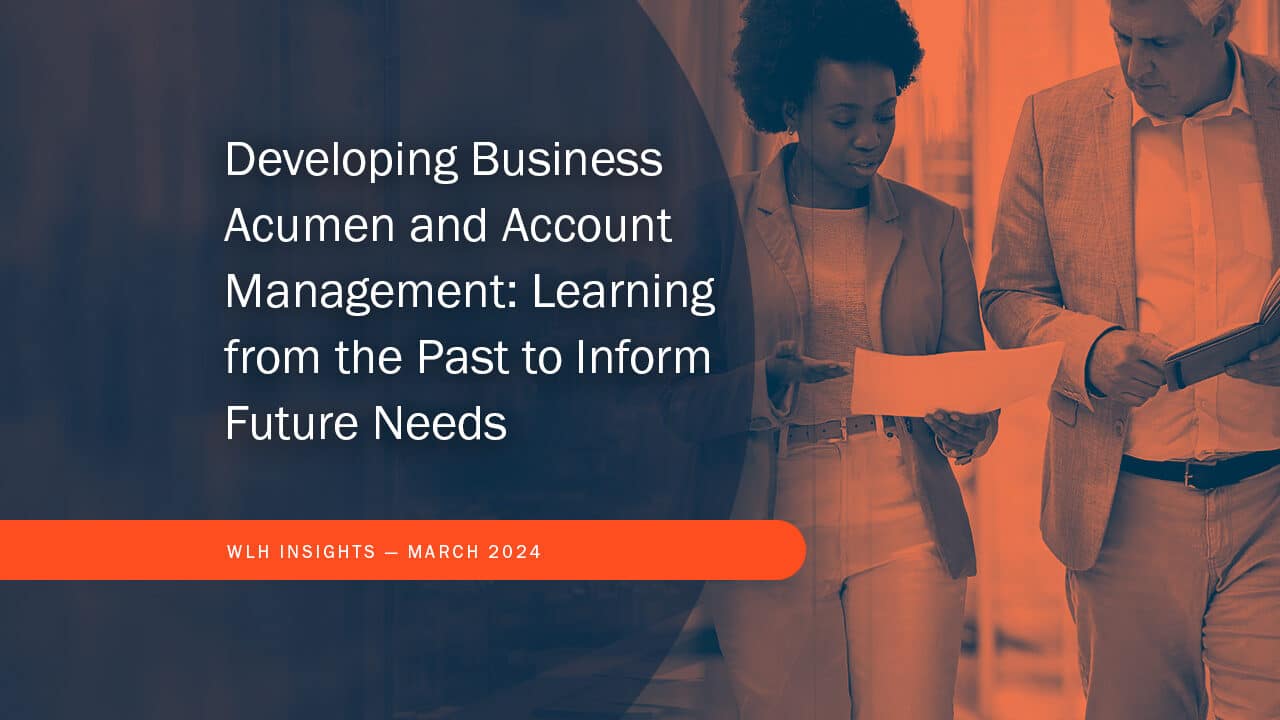Business acumen became a widely discussed critical competency for customer-facing roles in the pharmaceutical and life sciences industry about fifteen (15) years ago. At its core, business acumen means understanding how your customers and your company make money.
Throughout the past fifteen (15) years, Learning and Development functions varied in their commitment and investment in business acumen and account management skill development. Even with this increased focus and effort, why does strengthening business acumen remain a perceived gap requiring additional development?
A look back:
Before answering this question, it is important to acknowledge the progress and increased investments made to develop and strengthen business acumen skills. Initially, the definition of business acumen was variable and sometimes vague. Because of this, aligning senior leaders on a consistent definition was the first big win. Many life sciences and pharmaceutical companies’ definitions include demonstrating an understanding of the broader healthcare and local marketplace dynamics, being able to integrate data analytics into decision-making processes, working collaboratively with field counterparts to understand specific customer needs, and creating and executing targeted strategic plans.
Market Access organizations were the first groups to invest heavily in business acumen skill development within the evolving account management practices needed due to waves of consolidation amongst larger organized customers (Payers, IDNs, Medical Groups) and the shift to value-based care.
Going Forward
The healthcare marketplace continues to evolve in complexity, and the need for stronger business acumen and account management skills will likely not slow anytime soon. Therefore, when designing and delivering learning curricula to strengthen individual skills it is important to:
Focus on marketplace knowledge first:
Start by ensuring customer-facing employees have baseline knowledge of the various healthcare stakeholders and business models impacting prescribing decisions. This includes expanding knowledge in topics such as: accountable care organizations, integrated delivery networks, pharmacy benefit managers, oncology care, and other evolving segments. Learning professionals must ensure this information remains current and relevant.
Delve deeper with account profiling and stakeholder mapping skill development:
A basic principle of account management is that each customer is different, with unique clinical, business, operational, and reimbursement concerns and needs. It is important to systematically profile each account to uncover the customer’s drivers and generate actionable insights for the team. Often, an Account Lead takes primary responsibility; however, others on the team need to share information to develop a complete picture of the account, uncover priorities, and collectively agree on the best path for advancing goals and achieving trusted partnership status.
Enhance data analytic capabilities:
Customer-facing roles are often provided various sales and market analytics reports, yet team members’ ability to review, evaluate, and draw actionable insights from these reports may vary. To address this need, learning professionals should include data analysis skill development to enhance customer-facing team members’ ability to understand what is happening and why. Actionable insights are needed to ensure account teams can identify the best opportunities and execute against priorities.
Create a culture of collaboration:
Since account management for large, organized customers involves many different customer-facing roles and working in a compliant and coordinated manner, it is important to create a culture of collaboration. When larger, multi-role teams are not collaborating and coordinating well, opportunities are missed. Account leads need the skills to influence without authority. Individuals and team members need to take ownership for sharing information. Managers need to define clear behaviors, expectations, and reinforce and reward collaboration as a key value.
Develop account management leadership and coaching skills:
Field managers require specific skills to coach individuals who call upon more complex accounts with multiple stakeholders. Leadership development and coaching programs should be retooled with a primary focus on coaching all customer-facing roles to “connect the dots” as they planned and executed against priorities. Field sales leaders need regular briefings and coaching to understand changes in the evolving marketplace and how best to coach their direct reports to uncover customer needs and work across matrix teams in a more collaborative and coordinated manner.
Summary
Moving from strategy to effective execution requires a comprehensive approach and leadership support. By leveraging these lessons learned, an organization can take positive steps to enhance business acumen skills and develop talent. Creating an account management mindset through an effective curriculum and focused coaching supports the ability to achieve results. Learning professionals play a critical role as business partners to provide resources and develop customer-facing roles’ business acumen and account management mindset, will set, and skill set. WLH has been and continues to be privileged to work with clients determined to invest in their people to change behavior and drive performance.
